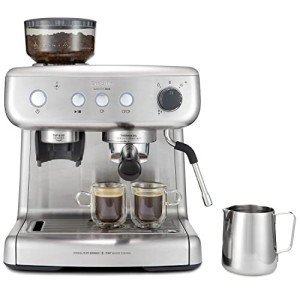The World of High-Quality Espresso Machines: A Comprehensive Guide
Espresso has actually become a cherished beverage among coffee enthusiasts worldwide, understood for its rich taste, intense fragrance, and flexibility. The heart of a great espresso depends on the machine used to brew it. High-quality espresso machines are designed to deliver the ideal shot, making them a vital financial investment for coffee enthusiasts. This short article explores numerous types of high-quality espresso machines, their features, upkeep tips, and answers to frequently asked questions.
Types of High-Quality Espresso Machines
High-quality espresso machines fall under several categories, dealing with various preferences, skill levels, and budgets. The primary types include:
| Type of Machine | Description | Suitable User |
|---|---|---|
| Manual Espresso Machines | Requires user skill to control extraction and pressure. Uses the most control over the developing procedure. | Experienced baristas and lovers |
| Semi-Automatic Machines | Integrates manual operation with automation. Users control the grind and tamping, while the machine handles water dispersion. | Intermediate users |
| Automatic Espresso Machines | Automate the brewing procedure, allowing for programmable developing times and temperature levels. | Casual coffee drinkers |
| Super-Automatic Machines | Have built-in mills and are fully automated, dealing with whatever from grinding to brewing and steaming. | Users looking for convenience |
| Commercial Espresso Machines | Designed for high volume use in cafes and dining establishments, providing durability and speed. | Entrepreneur |
Detailed Overview of Each Type
Manual Espresso Machines
- Pros: Complete control over the brewing procedure; can produce exceptional quality espresso.
- Cons: Requires considerable ability; time-consuming.
Semi-Automatic Machines
- Pros: Balanced control, mixing manual and automatic procedures; exceptional quality espresso is still achievable.
- Cons: Requires some understanding and experience to master.
Automatic Espresso Machines
- Pros: User-friendly; minimizes the finding out curve while still producing high-quality espresso.
- Cons: Still requires some understanding of coffee-making basics.
Super-Automatic Machines
- Pros: Maximal benefit; little skill needed; ideal for individuals or households who want coffee without fuss.
- Cons: Higher rate point; may do not have the fine-tuning capabilities of manual machines.
Commercial Espresso Machines
- Pros: Built for longevity and performance; typically consists of functions for high-volume turns.
- Cons: Expensive; may be overkill for home use.
Secret Features to Consider
When looking for a high-quality espresso machine, a number of crucial functions should be considered:
- Pressure and Pump Type: Look for machines with a minimum of 9 bars of pressure, which is necessary for extracting the best taste from coffee beans.
- Boiler Type: Single, double, and heat exchanger boilers each affect how the machine carries out and the speed of developing.
- Build Quality: High-quality products such as stainless steel are preferable for toughness and looks.
- Reduce of Use and Cleaning: Some machines need comprehensive cleaning, while others are created for easy maintenance.
- Temperature level Control: Consistent temperature is critical; think about machines with PID controllers for exact control.
Advantages of High-Quality Espresso Machines
Investing in a high-quality espresso machine uses a wide range of benefits:
- Superior Quality: High-end machines enable for higher control, leading to more delicious espresso.
- Toughness: Built to last, quality machines require fewer repair work and replacements.
- Personalization: Users can take pleasure in a customized experience by adjusting grind size, shot timing, and other settings.
- Increased Convenience: Automatic and super-automatic choices allow aficionados to delight in espresso with very little effort.
Maintenance and Care for High-Quality Espresso Machines
To keep an espresso machine working efficiently, routine maintenance is vital. Here are ideas for preserving a high-quality espresso machine:
Descale Regularly:
- Use a descaling service every couple of months to prevent buildup of minerals from water, which can impact flavor and performance.
Clean the Brew Group:
- For machines with a detachable brew group, tidy it frequently to make sure a clean extraction.
Change Water Filters:
- Use a water filter and alter it as needed to reduce pollutants in your developing water.
Daily Cleanings:
- Rinse the portafilter and group head after each use to prevent oil accumulation.
Watch on the Parts:
- Monitor seals, gaskets, and other parts for wear and tear and replace them as needed.
Regularly Asked Questions (FAQs)
1. What is the best espresso machine for newbies?
For beginners, a semi-automatic machine frequently offers a good balance of usability and control, allowing users to learn the abilities necessary for making great espresso.
2. Are check this link right here now -automatic machines worth the investment?
Yes, for those who focus on convenience and ease over control, super-automatic machines can be a deserving financial investment, specifically for families or hectic experts.
3. How much should I anticipate to invest in a high-quality espresso machine?
High-quality espresso machines range substantially in price, with manual machines starting at a couple of hundred dollars, while super-automatic or commercial machines can surpass several thousand.
4. Can I make other coffee beverages with an espresso machine?
Yes, many espresso machines have steam wands or accessories that allow users to create lattes, cappuccinos, and more.
5. For how long do espresso machines normally last?
With appropriate maintenance, high-quality espresso machines can last over a years, making them a long-lasting financial investment in your coffee enjoyment.
High-quality espresso machines yield a transformative coffee experience, whether taken pleasure in at home or in a commercial setting. By comprehending the types readily available, their features, and the maintenance needed to keep them running efficiently, customers can make informed decisions that elevate their coffee-drinking experience.

